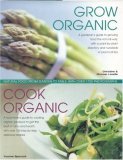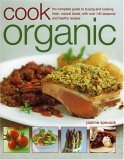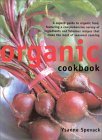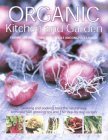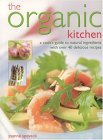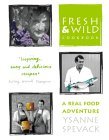Is Organic Better For You?

Want to know if organic food is really a better buy? Ysanne Spevack asks a dozen of the top food experts, scientists, farmers, professors and nutritionalists in Britain. Get the information you need. Read on to find out the truth behind organics…
Renée Elliott, founder of Planet Organic
Renée J Elliot is the founder of Planet Organic, the original organic and natural food supermarket. She is also on the Council of the Soil Association.
There’s no question! Organic food is grown and stored without the use of artificial pesticides and fertilisers. The fact that residues remain on conventional foods and are consumed by us over decades, accumulating in our fatty tissues is well documented. Ignoring this danger to health completely, as there has been no comparative longterm research about the difference between the longterm effects of consuming conventional versus organic foods, it is still obvious that organic food is better for you.
If you look at beef and dairy as a category, organic food contains no antibiotic residues, growth promoters or BSE. If you look at processed foods, organic food contains no artificial additives, preservatives, colourings or flavourings, and no hydrogenated fats, which are directly related to increased rates of heart disease. The seven thousand artificial additives permitted in nonorganic foods are used to make food last beyond its natural sellby date, make it appear brighter or more colourful, and/or taste sweeter, saltier or just plain better than the manufacturer could manage without these crutches. At best, these additives are unnecessary and annoying to those who question their use and usefulness. At worst, they are possible carcinogens and could be causing damage that no one has bothered to study. Organic food contains only seven of the most innocuous natural additives.
Lastly, all allegations linking organic food and food poisoning have been disproved. Organic food has not been associated with any case of food poisoning in any year since the Center for Disease Control & Prevention records began.
Dr Richard Harding, Food Standards Agency
Dr Harding is the Head of the Food Standards Agency’s Food Chain Division. The Division leads focal investigations into food safety and standards in specific areas from the farm onwards. Issues related to organic food cut across several of the Agency’s Divisions. Dr Harding heads and coordinates work in this area.The Food Standards Agency position paper on organic foods can be found on the Agency’s website, www.foodstandards.gov.uk
Last summer, the Agency published a position paper on organic food stating that currently there is not enough information to say that, as far as food safety and nutritional quality are concerned, organic food is any better or worse than conventionally produced food. Therefore, the Agency is opposed to members of the food industry that make health, or quality claims regarding organic food, simply because they mislead the consumer.
Consumers may wish to buy organic food for a variety of reasons. They may think it tastes better, or prefer the methods of production. That is obviously a personal choice. Our job is to ensure they can make that choice based on clear and meaningful labelling and sound scientific advice.
As far as nutrition is concerned, what matters is the nutrient content and overall balance of the diet as a whole. A varied and balanced diet which includes plenty of fruit, vegetables and starchy foods should provide all the nutrients that a healthy individual requires, regardless of whether the individual components are produced by organic or conventional methods. As far as food safety is concerned, it is the Agency’s aim to work on behalf of consumers and ensure that all food on retail sale, whether organically or conventionally produced, is safe for consumption. That is our job, and that is what we are doing.
Craig Sams, President Whole Earth Foods and Green & Blacks
Craig Sams founded Europe’s first macrobiotic restaurant in the 1960’s, invented the VegeBurger in the 1980’s, and brought us Green & Black’s chocolate in the 1990’s. Craig is a very active and knowledgeable organic speaker and pioneer.
There is so much research that confirms that organic food is better for you that it is amazing that the Food Standards Agency are either ignorant of it or don’t understand what organic food is about.
Organic food regulations prohibit hydrogenated fat (cause of heart disease, cancer, diabetes and obesity), aspartame (neurotoxin), phosphoric acid (in cola drinks — causes osteoporosis), antibiotics (reduced immunity), hormones (gender confusion, obesity, multigenerational cancer), pesticides (mutagenic, carcinogenic and with unknown ‘cocktail effects’), BSE (human vCJD), GMOs (Puztai’s research suppressed, but probably IBS, Crohn’s disease, autism, other gutbased disease), or any of the 7000 artificial colourings, flavourings, preservatives and processing aids that are permitted in conventional food (cancer, liver disease, gut problems).
But that’s only the dodgy chemicals that you avoid when you eat organic. Organic farming also keeps animals healthy as the use of drugs is restricted, so salmonella, cryptosporidium and listeria are rare in organic foods. E.coli O157:H7 kills over 200 Americans and Britons each year and arises directly from intensive cattlerearing. It is virtually nonexistent in organic beef. Surviving E.coli is better than dying, but hamburger consumption is now the main cause if kidney failure among American kids. That’s a high price to pay for a 99 cent hamburger.
Patrick Holford, Institute of Optimum Nutrition
Patrick Holford is the founder of the Institute of Optimum Nutrition in London, and one of the world’s leading nutritionists. More details about his work can be found at www.patrickholford.com
Organic, unadulterated wholefoods have formed the basis of human diet through the ages. Only now has the human race been subjected to countless manmade chemicals found in food and the environment.
Eat foods that provide exactly the amount of energy required to keep the body in perfect balance. A good deal of energy is wasted trying to disarm alien and often toxic chemicals, some of which cannot be eliminated and accumulate in body tissue. Choosing organic foods whenever possible is the nearest we can get to eating a pure diet today. By supporting the organic movement, we help to minimise the damage of chemical pollution which poses a real threat to the future of humanity.
Raw, organic food is the most natural and beneficial way to take food into the body. It is especially important to buy organic grains. Each and every nonorganic grain has been sprayed. The surface area of your breakfast cereal is vast, and many leading brands of cereals are found to contain large amounts of organophosphate fertilisers.
In straightforward nutritional analyses, organic food tends to have more in it, both in terms of dry weight and nutrients (see chart below). This is because organically grown produce must be grown in enriched soil and because modern methods of farming with agrochemicals can speed up the growth of a plant, changing its structure to be more full of water. In other words, although it may still look like a carrot you are actually buying less food.
The average price difference between organic produce an nonorganic produce is around 20 per cent. Organic produce was found, on average, to contain 26 per cent more dry matter (less water) — therefore actually making it cheaper to buy organic. This is why nonorganic produce tends to shrink more on cooking as its high water content evaporates.
Comparison of Organic vs NonOrganic Produce
Component Mean % increase in organic produce vs nonorganic produce
- Dry matter +26%
- Potassium +13%
- Calcium +56%
- Magnesium +49%
- Iron +290%
- Copper +34%
- Manganese +28%
- Protein +12%
- Essential amino acids +35%
- Nitrates +69%
- Phosphorous +6%
Charlotte Reynolds, Swaddles Green Farm
Charlotte and husband Bill have run Swaddles Green Farm in Somerset for over 15 years. Charlotte trained as a biochemist, and comes from a farming family. Visit www.swaddles.co.uk for more information about Charlotte and Bill’s farm and their organic meat delivery scheme.
Before World War II, farming was a noble occupation. Farmers treated their land and animals with respect. They had a duty to pass the farm on to the next generation in good condition and were proud to produce some of the finest food in the world. Urged by successive governments to produce more and more as cheaply as possible, and amply aided by Britain’s burgeoning chemical industry, our farms are now highly industrialised, producing some of the most debased food in the world. Animals become figures on a balance sheet and soil a mere medium for advanced hydroponics. Hedges are ruthlessly ripped out to make way for gargantuan machinery and villages die as farm workers are no longer needed.
Organic farmers are fighting to redress the balance, improve the land we farm and treat our animals as living beings deserving respect and good treatment. This requires dedication and hard toil. An outbreak of docks in a field of wheat has to be taken out by hand — back breaking work. Straw bedding is expensive and has to be mucked out frequently — labour intensive. There are no cheap feed alternatives. Animals take twice as long to grow. Yields per acre are lower. But we can continue to produce in this way year after year. When we leave there will still be song birds living on our insects and nesting in our hedges. Trees that took a lifetime to grow will still be there to give shelter from the sun and wind. People will still be needed to work the land. And we take pride in producing some of the finest food in the world.
Professor Philip Stott, University of London
Philip Stott is Professor of Biogeography in the University of London and Editor of the Journal of Biogeography (Blackwell Science). He has a longterm research interest in the construction of environmental myths, and his latest book, edited with the anthropologist Dr Sian Sullivan, is Political ecology: science, myth and power (Edward Arnold, 2000).
All biologicallybased foods are organic in that they contain carbon and once demonstrated the attributes of life. By contrast, concepts such as ‘organic salt’ are simply nonsense. Salt is inorganic. The appropriation of the word ‘organic’ for just one form of agricultural production is totally unacceptable. Moreover, what precisely constitutes this form of agriculture varies around the world, and there are many different standards, and sometime no standards at all. Like all farming, socalled ‘organic’ systems have both benefits and dangers, but there is no clear scientific evidence that these systems are safer or that they produce products which taste better or which are healthier for you. Indeed, it is widely recognised that there are potentially serious problems and dangers, including the faecal contamination of streams; bacteria from inadequate composting; the production of aflatoxins and other carcinogens; poor storage, and so on.
Many of these problems could, however, be solved by combining biotechnology with ‘organic’ production systems, and the recent attempts to set biotechnology and ‘organic’ agriculture in opposition to each other are both false and very sad. Above all, ‘organic’ agriculture and products are more about myth and ‘New Age’ religion than about science and reality, and about a lost golden ‘organic’ utopia, which never existed. ‘Organic’ marketing also plays on many middle class fads and fancies, with notable twaddle like ‘Organic ginseng’ and ‘Organic hypericum’! My personal prediction is that the overhyping of ‘organics’ will ultimately end in tears.
Michael van Straten, nutritional consultant, writer and broadcaster
Michael has presented ‘Bodytalk’ on LBC radio in London for over twenty years. He is a highly skilled osteopath, naturopath, acupuncturist and nutritional consultant, and has written twenty books about nutrition and complimentary medicine.
Organic food is not only better for your health, but is also better for the environment. Noone in their right mind trusts government or industry assurances that agrochemical residues in food are safe — we’ve heard it all before. Salmonella, listeria, BSE and now foot and mouth disease all point to the failings of factory farming. The Ministry of Agriculture, Fisheries and Food has always been the friend of the farmer and the chemical industry — not the consumer, but it’s the consumer who carries the can when things go wrong. The assumptions on safety do not hold water, especially when the precautionary principle of proving safety rather than demonstrating minimal risk, is not applied.
Not only is organic food free from the highly toxic pesticides, herbicides, fungicides, antibiotics and growth hormones used in intensive farming, but they’re also free of artificial colourings, flavourings, additives, sweeteners and the thousands of other unwanted and unnecessary chemicals used in food manufacturing.
Naturally grown and ripened produce, especially when it’s local, has a higher content of essential vitamins and minerals. Organically reared beef contains less of the arteryclogging saturated fats in the muscle tissue, so more of the fat content is visible and easily removed. Only grass fed beef contains the essential CLA fat which helps regulate the way our bodies deal with other fats. As well as all this, organic food tastes better.
Shane Heaton, Natural Health
Shane Heaton is a nutritionist and organic food expert from the Institute for Optimum Nutrition. For the last 18 months, he has been investigating scientific evidence about food quality, comparing organic and conventional crops. Shane is currently writing a comprehensive report of his findings for the Soil Association. He can be contacted at ShaneandCathHeaton@compuserve.com
There are numerous studies demonstrating no nutritional difference between organic and conventional fresh produce. However, closer examination of these studies often reveals fundamental flaws that either invalidate their results or do not allow conclusions to be drawn. The remaining valid comparisons demonstrate a strong trend toward organic foods having more nutrients than conventional foods. Pesticide residues in and on conventional foods may be higher than is being reported due to sample variations and losses during analysis. These residues may be more toxic than expected due to the synergistic effects of multiple residues on foods that can accumulate in human tissue.
The health effects of pesticides in our food and the environment are slowly becoming clear; immune suppression, hormone disruption, neurological damage and more. Accusations of organic food being a greater toxicological risk (from E.coli 0157 or aflatoxins) are unsubstantiated, with no real evidence or logic to justify them. For the most complete answer to this question, look out for the Soil Association report examining evidence of the links between organic farming, food quality and human health, due out this summer.
Carol Charlton, founder the Organic Café in London
Carol Charlton is the founder of the UK’s first registered organic restaurant in Lonsdale Road, West London. She now manages two organic restaurants, two organic cookshops, and an organic home store.
There are only two words to say to people who ask if organic food is better for you.
The first is ‘BSE’. Our own beef comes from an organic farm in Pembrokeshire and neither they nor their parents nor their grandparents before them have ever had sheep’s brains or other unnatural substances mixed up in their food. Nonorganic conventional farming, however, in pursuit of a cheap food policy, has fed our cattle, pigs and sometimes sheep for years on commercial food processing waste including the carcasses of other animals. Now we are reaping the results in the shape of the terrible tragedy of BSE.
The second word is ‘Pesticides’. People simply don’t understand how dangerous they are. Some of them are related to nerve gases and all of them are poisonous. They have to be — they are designed to kill. But what we don’t know is what the accumulation of potent pesticide residues do to us. It is particularly worrying for children, who may consume large quantities of fruit juice and fresh fruit. It is not a risk we should even contemplate taking and it is especially not a risk we should take with our children.
Tony Combes, Monsanto
Tony is Head of Corporate Affairs for the UK section of multinational biotechnology corporation Monsanto. He held management positions with several leading food retailers including Marks & Spencer and Waitrose between 1971 to 1978, when he became the Confederation of British Industry’s Assistant Regional Director for the South West. He was appointed Public Affairs Manager for Safeway in 1985, and helped launch Safeway’s GM tomato puree in 1996 — the world’s first genetically modified whole food.
Organically grown food is probably no better for you than either conventional or GM food. What really matters is the nutrient content and overall balance of our diet as a whole, rather than the composition of individual foods. However, what always used to be better, was the taste and flavour of organic fruit and vegetables — but only when they have been grown from seeds or varieties bred exclusively for flavour, rather than commercial yield and quantity, or harvest uniformity.
When Safeway was the only supermarket selling organics in the early ’80s, there was sufficient of this better produce for the few who wanted it — and could afford it; my personal experience recently has been that the supermarkets seem to have captured the traditional varieties of organically grown tomatoes for example, and now grow them also for quantity — literally helping to grow the market and so reduce the relative cost for the 23% of the public who now regularly buy organic. But the result it seems, is that original, specialist organic retailers are having to make do with newer varieties which in some cases taste no better than many commercially available, conventional varieties, which have themselves been bred for flavour rather than quantity. How ironic if the organic industry were to let slip the one asset which makes them better — taste — on the populist altar of expanded production.
Lizzie Vann and Diane Mulligan, Organix
Lizzie Vann is the founder of the children’s food company Organix, and Dianne Mulligan is her marketing manager. Organix is the UK’s leading organic babyfood manufacturer, and has won over a dozen awards. Lizzie and Dianne work closely with a community of parents, health professionals and food campaigners, aiming to raise standards on all foods that might be eaten by children.
At Organix we clearly believe that it is — that’s why the company exists! However, organic food isn’t necessarily actually healthy. Organic sugar and sweets still rot your teeth. Lashings of organic butter can make you put on weight and fur up your arteries.
Organic food’s strength lies in what it doesn’t contain. This stretches well beyond excluding agricultural chemicals such as fertilisers and pesticides, to prohibition of artificial preservatives, colours, sweeteners, residual antibiotics, hydrogenated fats, processing aids and meaningless starches. There is, in fact, only food in organic food.
Whilst adults are well advised to avoid the chemical cocktail cited above, babies and young children are in a far more vulnerable position. Babies eat up to five times as much food per kg of body weight compared to adults, and they eat far more fruits and vegetables — the very foods most likely to contain agrichemical residues. Their central nervous system, kidneys, liver and immune system are immature, and unable to excrete these contaminants efficiently.
Food regulations recognise babies’ delicate systems by banning preservatives and artificial colourings from all baby food, organic or not. It makes sense, therefore, to avoid all the other synthetic chemicals in our foods, with their potential links to asthma, skin problems, behavioural changes, fertility issues, laboratory cancers, and so on.
Organix believes passionately in the spirit, as well as the facts, of organic standards, which is why we are the strictest at excluding all the ingredients that could make processing simpler or cheaper, but don’t add to its food value. Do read the labels even on organic babyfoods — not all manufacturers are as particular.
The ‘real food only’ factor is key to ensuring that organic baby food is better for babies. Conventional baby foods can contain starchy thickeners and more water than is necessary, reducing the nutritional density of the food. Babies don’t eat much or very often to begin with, so it’s important that every spoonful makes a positive nutritional contribution. A glorious side effect of this is that babies are ‘trained’ to accept the taste of real food, and it’s becoming clear that this is a critical factor in the food preferences they will have as adults.
A final point. Working with babies, it’s impossible not to consider the future, and the quality of life they can expect for the next seventy years. Healthy eating is one thing, but there’s no question that their lives would be much poorer if conventional farming continues to pollute water, change historic landscapes into arable deserts, reduce the ozone layer for the sake of a few more strawberries and allow the return of diseases that modern society believed it had beaten, because of the overuse of antibiotics in animals.
For healthy children with happy prospects, choose organic food.
Like this page? Please link to us and let the world know!




